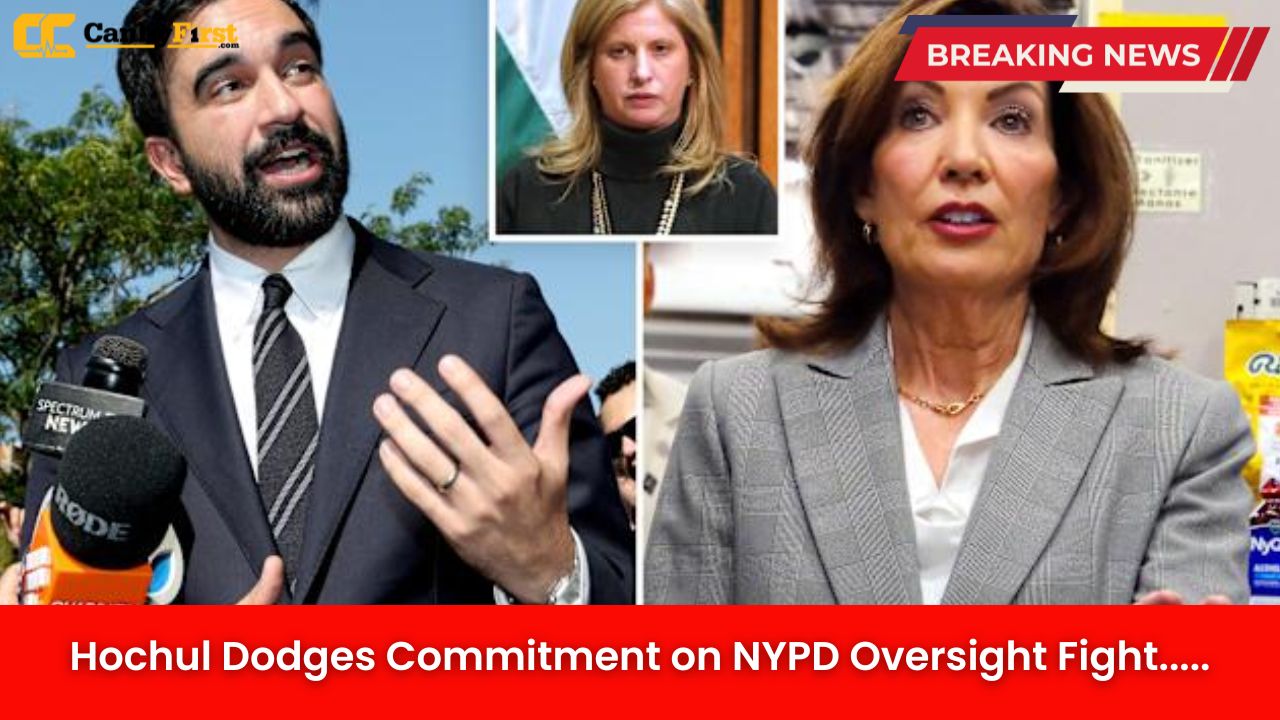New York Governor Kathy Hochul is facing renewed scrutiny after she refused to commit to blocking a controversial legislative push by Assemblymember Zohran Mamdani that could strip the NYPD commissioner of their disciplinary authority over officers. The move signals growing tension between state lawmakers seeking police accountability reforms and the governor’s cautious approach to law enforcement politics.
A Growing Rift Over Police Discipline
The issue centers on who should hold final say in disciplining New York City police officers accused of misconduct. Under current law, the NYPD commissioner has ultimate authority in disciplinary cases, including decisions to fire or suspend officers following internal or external investigations.
Assemblymember Mamdani, a progressive Democrat representing Queens, has championed legislation that would transfer that power to an independent body. Supporters argue this would make the process more transparent and accountable, pointing to longstanding criticisms of internal policing and what they describe as a “culture of protection” within the department.
Also Read
When pressed by reporters at a public appearance this week, Governor Hochul declined to say whether she would oppose Mamdani’s bill, instead emphasizing her focus on maintaining safety across New York while ensuring fairness in the justice system.
“I always look for balance,” Hochul said, adding that she believes in reviewing “all proposals carefully before taking a stance.”
Reformers Challenge Status Quo
The proposed legislation would mark one of the biggest shifts in NYPD oversight in decades. Reform advocates have long argued that internal disciplinary decisions lack impartiality, particularly in cases involving excessive force or misconduct toward civilians.
Mamdani’s plan calls for an independent disciplinary board composed of legal and civil rights experts to make final determinations, effectively removing the NYPD commissioner’s veto power. This change, they argue, would bring the nation’s largest police department more in line with other major cities that have adopted independent oversight mechanisms.
“The people of New York deserve to know that justice is not being decided behind closed doors at One Police Plaza,” Mamdani said in a recent interview. He added that “accountability cannot exist where the same institution that commits misconduct has the final word on punishment.”
Police and Union Pushback
Unsurprisingly, the proposal has met fierce resistance from police unions, who argue that taking disciplinary authority away from the commissioner would undermine the chain of command and weaken internal accountability.
Patrick Hendry, head of the Police Benevolent Association, has warned that such a move would “politicize discipline” and give outside groups undue influence over internal decisions. He insists that the NYPD already has mechanisms to review misconduct cases, including Civilian Complaint Review Board (CCRB) investigations and oversight by the Department of Investigation.
Hendry also accused lawmakers like Mamdani of “demonizing police officers for political gain” at a time when New York is struggling to maintain public safety.
Hochul’s Political Balancing Act
Governor Hochul’s reluctance to take a clear side reflects the political tightrope she faces. On one hand, she needs support from New York’s progressive base, many of whom are demanding deeper police reform and accountability. On the other, she must maintain a working relationship with the NYPD and moderate voters who remain wary of any moves perceived as anti-police.
As the November legislative session approaches, insiders say Hochul may attempt to broker a compromise — potentially allowing limited oversight changes without completely transferring disciplinary control.
“She’s walking a fine line,” said a Democratic strategist familiar with Albany politics. “Hochul doesn’t want to alienate progressives before next year’s elections, but she also doesn’t want to be painted as soft on crime.”
A Wider Debate Over Police Power
The standoff underscores a broader national debate about how much power law enforcement leaders should hold in matters of discipline and accountability. The NYPD commissioner’s authority over officer discipline has roots dating back to early 20th-century policing, predating modern oversight structures.
Critics argue that this setup no longer fits a city as large and diverse as New York, especially given repeated scandals over excessive use of force and discriminatory practices. Proponents of the current system counter that central authority ensures consistency and prevents politically motivated punishment.
The proposed shift could also have ripple effects beyond New York City, setting precedent for other municipalities exploring similar measures.
City Hall’s Calculated Silence
Mayor Eric Adams, himself a former NYPD captain, has thus far avoided taking a strong stance on the proposal. While he has previously expressed openness to reforms that “build trust,” Adams has consistently defended the commissioner’s authority as essential to department discipline.
“It’s critical for leadership to maintain internal control,” he said in a recent press briefing. “You can’t lead if you don’t have authority over your own team.”
Adams’ silence has only added to speculation that the state debate could grow into a citywide political flashpoint heading into the next election cycle.
The Road Ahead
The legislative proposal is still in the early stages, but gaining traction among progressive lawmakers who see it as part of a larger movement to reimagine policing in New York. With Hochul declining to commit publicly, advocates are ramping up pressure, planning rallies and public campaigns aimed at pushing the bill onto the 2026 legislative agenda.
Meanwhile, police leaders and moderate Democrats are mobilizing to stop it before it reaches the governor’s desk, warning of “unintended consequences” that could cripple department morale and slow disciplinary proceedings.
Whether Governor Hochul ultimately sides with reformers or law enforcement, the decision could define her leadership on criminal justice—an issue that has divided New York politics for years.
FAQs
What is Zohran Mamdani’s proposal about?
It seeks to remove the NYPD commissioner’s final authority in disciplinary cases, giving that power to an independent oversight board.
Why is Governor Hochul’s stance important?
As governor, Hochul could influence or veto any legislation passed by the state legislature, making her position crucial to the bill’s fate.
How do police unions feel about the proposal?
They strongly oppose it, arguing it would weaken police leadership and politicize officer discipline.
What do reform advocates want to change?
They want a more transparent disciplinary process free from the NYPD’s internal control, increasing public accountability.
Could this reform impact other cities?
Yes. If passed, it could serve as a model for other major police departments considering similar oversight reforms.












